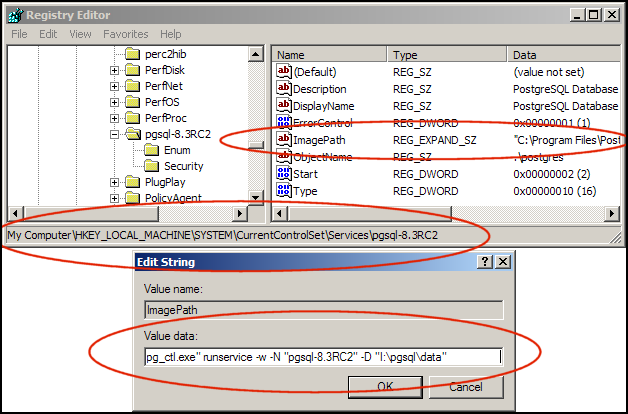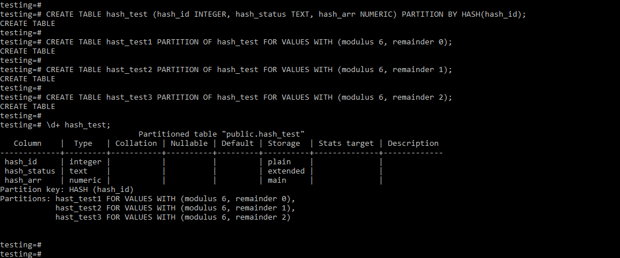
- #POSTGRESQL ALTER TABLE PARTITION BY RANGE ARCHIVE#
- #POSTGRESQL ALTER TABLE PARTITION BY RANGE CODE#
\echo ALTER TABLE payment ATTACH PARTITION payment_old FOR VALUES FROM ( : 'mn' ) TO ( : 'mx' ) ALTER TABLE payment ATTACH PARTITION payment_old FOR VALUES FROM ( : 'mn' ) TO ( : 'mx' ) \echo CREATE TABLE payment ( LIKE payment_old INCLUDING ALL ) PARTITION BY RANGE (created ) CREATE TABLE payment ( LIKE payment_old INCLUDING ALL ) PARTITION BY RANGE (created ) \echo ALTER TABLE payment RENAME TO payment_old ALTER TABLE payment RENAME TO payment_old - END rename payment to payment OLD \echo - BEGIN rename payment to payment OLD - rename payment to payment OLD

#POSTGRESQL ALTER TABLE PARTITION BY RANGE ARCHIVE#
\echo alter table payment add column archive boolean Īlter table payment add column archive boolean take advantage of downtime to modify table with a new column add Primary Key new \echo alter table payment add constraint payment_id_created_pk primary key using index payment_id_created_idx Īlter table payment add constraint payment_id_created_pk primary key using index payment_id_created_idx \echo :drop_constraint do : 'drop_constraint' \ set drop_constraint 'begin execute ' : 'drop_constraint' ' end ' table_constraints where table_name = 'payment' and constraint_type = 'PRIMARY KEY' \gset Select concat ( 'alter table payment drop constraint ', constraint_name ) as drop_constraintįrom information_schema. drop indexes frustratingly takes locks that block the applicaton DROP INVALID INDEXES - take the opportunity to clean up will application id down \echo ALTER TABLE orders DROP CONSTRAINT orders_id_fkey ALTER TABLE orders DROP CONSTRAINT orders_id_fkey \echo - BEGIN DROP FOREIGN KEYS - DROP FOREIGN KEYS SET time period constraint to true SELECT do_set_convalidated ( 'payment' : :regclass, 'payment_check_created', true )
#POSTGRESQL ALTER TABLE PARTITION BY RANGE CODE#
\echo - BEGIN VALIDATE time constraint google code \echo created = : 'mn' : :timestamp without time zone ANDĬreated < : 'mx' : :timestamp without time zone ) NOT VALID \echo created >= : 'mn' : :timestamp without time zone AND \echo ALTER TABLE payment ADD CONSTRAINT payment_check_created \echo : 'mn', : 'mx' - set a contraint on payment on the min and max dates if satisfied its running correct, turn REPLICATION back onĪLTER TABLE payment DROP CONSTRAINT payment_check_created select ( min (created ) : :timestamp : :date + interval '0' hour ) as mn, ( ( max (created ) + interval '1' day ) : :timestamp : :date + interval '0' hour ) as mx Bounce DB with GCP API script to turn autovacuum on


I'm not sure what the issue was, I just made the CONSTRAINT look exactly like the PARTITION definition and then it worked. Thus I looked at the partition definition and it had a NOT NULL constraint as well as "without time zone".

I had done this before and it had worked. 12 hours, then swapping it in and it hung again, i.e. I was like "what, is the google procedure changing the wrong data?" I want as far as validating the whole table, i.e. I would add the constraint NOT VALID, run the google procedure to make it valid in the data dictionary, then attach it as a partition and and and. If there is no constraint, then the database will scan the whole table to make sure it conforms to the partition time range. The science of the constraint is that when the constraint matches the partition constraint and is valid, the database will swap in the table immediately. I put a time range constraint on payments_old that matched the time constraints of the partition it was going to become. H "Authorization: Bearer $(gcloud auth print-access-token)" \


 0 kommentar(er)
0 kommentar(er)
